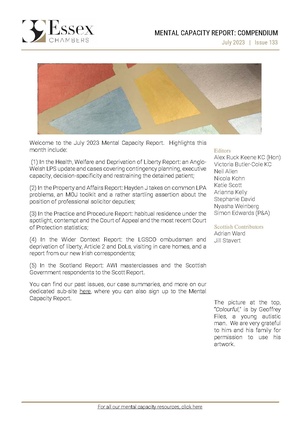Information for "Norfolk and Suffolk NHS Foundation Trust v HJ (2023) EWFC 92"
Basic information
| Display title | Norfolk and Suffolk NHS Foundation Trust v HJ [2023] EWFC 92 |
| Default sort key | Norfolk and Suffolk NHS Foundation Trust v HJ (2023) EWFC 92 |
| Page length (in bytes) | 1,848 |
| Page ID | 15110 |
| Page content language | en - English |
| Page content model | wikitext |
| Indexing by robots | Allowed |
| Number of redirects to this page | 0 |
| Counted as a content page | Yes |
| Page image |  |
Page protection
| Edit | Allow only users with "editing" permission (infinite) |
| Move | Allow only users with "editing" permission (infinite) |
Edit history
| Page creator | Jonathan (talk | contribs) |
| Date of page creation | 23:37, 3 July 2023 |
| Latest editor | Jonathan (talk | contribs) |
| Date of latest edit | 19:09, 2 June 2024 |
| Total number of edits | 4 |
| Total number of distinct authors | 1 |
| Recent number of edits (within past 90 days) | 0 |
| Recent number of distinct authors | 0 |
Page properties
SEO properties
Description | Content |
Article description: (description)This attribute controls the content of the description and og:description elements. | HJ was detained under MHA 1983 s3 but treatment under restraint for her constipation could not be provided under MHA 1983 s63. The trust asked the court to authorise deprivation of liberty; the judge in email correspondence expressed doubts; subsequently the trust and Official Solicitor changed their minds and agreed that the treatment did not involve deprivation of liberty. The judge decided: (1) The following principles apply: (a) only in exceptional cases will something amount to a further deprivation of liberty of someone already lawfully deprived of liberty; (b) this is because the usual position is that Article 5(1)(e) is not in principle concerned with suitable treatment or conditions; (c) the test is whether there is an unacceptable element of arbitrariness in the actions taken by a state body. (2) Applying that approach, proper and lawful exercise of clinical judgment will, save in exceptional circumstances, lack arbitrariness and will not amount to deprivation of residual liberty; partly that is because the trust owe a common law duty of care to the patient to provide appropriate treatment (the patient cannot be deprived of liberty by actions that the trust are required to take). (3) The MCA 2005 s4 best interests process, MCA 2005 s6 restraint limitations, MHA framework and Mental Health Units (Use of Force) Act 2018 requirements are a sufficient procedural framework for Article 8 purposes and do not need to be supplemented by a court order. |